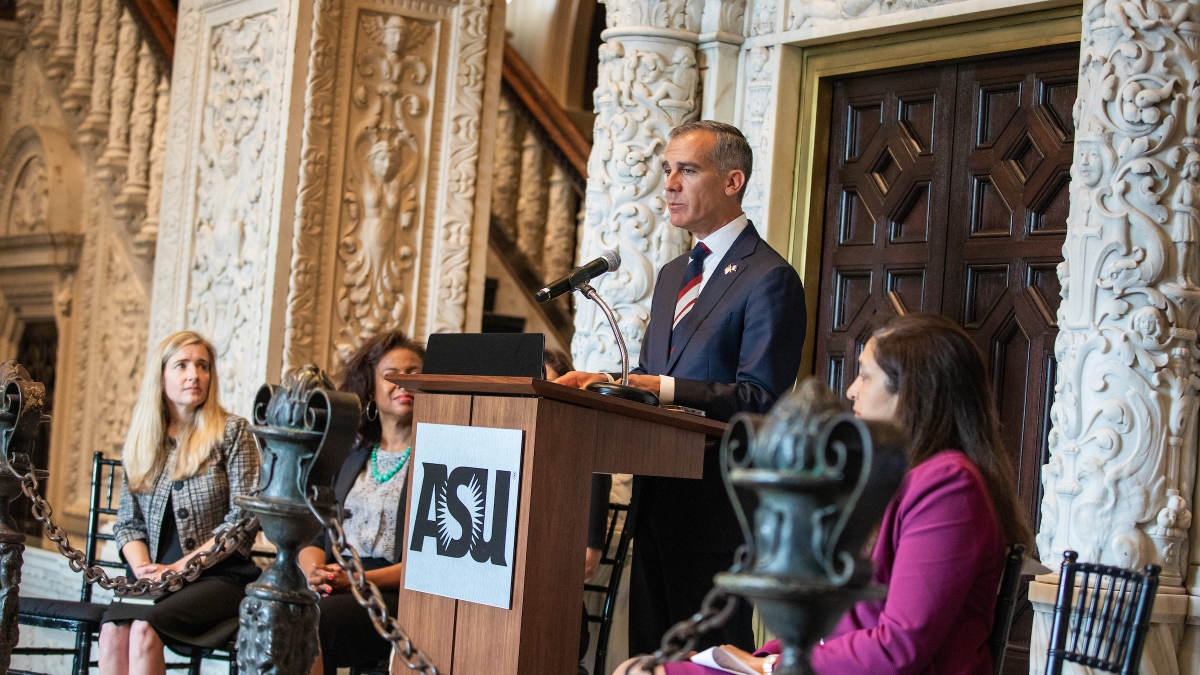Mayors from some of the region’s largest cities met at Arizona State University on Wednesday to collaborate on strategies for violence prevention.
The roundtable event, held at the ASU California Center in downtown Los Angeles, was co-hosted by Los Angeles Mayor Eric Garcetti, the Civil + Human Rights and Equity Department of Los Angeles, the Strong Cities Network, the McCain Institute for International Leadership at ASU, and the Violence, Inequality and Power Lab at the University of San Diego.
The event included mayors from Bogotá, Colombia; Villa Nueva, Guatemala; and Moravia, Costa Rica, who were in Los Angeles to attend the weeklong Summit of the Americas event.
MORE: ASU Cronkite School hosts 1st Media Summit of the Americas | US secretary of state emphasizes value of a free press at ASU-hosted event
Garcetti said that violence is one of the tragic things that unites mayors from across the Americas.
“We can’t say for sure that that young man or young woman is alive because of our work, but we know in our bones that the work we do saves lives,” he said.
“We can see it statistically from year to year when we invest in the right models of policing, when we invest in prevention and intervention, and when we invest in human development in a way that brings these pieces together — gender equity, the importance of education, after-school programs and violence interruption from a trauma-informed perspective.”
Garcetti said that Los Angeles has already borrowed best practices from other cities, such as a participatory budgeting program from Brazil and violence-interruption strategies from Central America.
He said the best ideas often come from tragedy.
“We see mothers and fathers who have lost their children become the most powerful advocates to interrupt gun violence, interrupt gang membership and to interrupt of the cycle of youth going in and out of prison,” he said.
Garcetti and the Los Angeles City Council created the Civil + Human Rights and Equity Department last year, known as LA Civil Rights.
The department recently launched the largest hate-crime prevention campaign in the city’s history, with messaging in 18 languages, said Capri Maddox, LA Civil Rights executive director.
“So much of what we do at LA Civil Rights — from addressing hate to expanding equity — is violence prevention,” she said.
Uzra Zeya, the U.S. Department of State undersecretary for civilian security, democracy and human rights, told the mayors that the Biden administration supports a public health approach to fighting violence.
“Evidence indicates that urban violence tends to be often concentrated on particular street corners and is often committed by a small number of individuals, especially young men. It’s associated with high-risk behaviors, such as carrying guns, substance abuse and joining gangs.
“In most major cities, only 0.5% of the population is responsible for 75% of the homicides.”
A public health approach treats violence as a disease, with diagnosis of those affected, targeted intervention and preventive measures. This includes pushing back against hate crimes and ethnically motivated violence. Data collection can help with “hot spot mapping” and assessing risk levels.
Police must be strengthened, she said, but not without acknowledging abuses committed by security forces.
“A lack of trust between the community and police is one of the main impediments to improved security,” she said.
Zeya said the Biden administration is proposing spending $5 billion in the U.S. and $4 billion in Central America to address the root cases of migration, including violence.
Bogotá Mayor Claudia López said her city is addressing violence by guaranteeing victims full access to justice so that impunity is avoided.
“We are providing opportunities,” she said.
“Employment, care and a decent life are the best tools to prevent violence.”
Top image: Los Angeles Mayor Eric Garcetti addresses mayors from the Americas at a roundtable event held at the ASU California Center on Wednesday. At left is Brette Steele, senior director for preventing targeted violence at the McCain Center for International Leadership at ASU. Photo by Deanna Dent/ASU News
More Law, journalism and politics

How to watch an election
Every election night, adrenaline pumps through newsrooms across the country as journalists take the pulse of democracy. We gathered three veteran reporters — each of them faculty at the Walter…
Law experts, students gather to celebrate ASU Indian Legal Program
Although she's achieved much in Washington, D.C., Mikaela Bledsoe Downes’ education is bringing her closer to her intended destination — returning home to the Winnebago tribe in Nebraska with her…

ASU Law to honor Africa’s first elected female head of state with 2025 O’Connor Justice Prize
Nobel Peace Prize laureate Ellen Johnson Sirleaf, the first democratically elected female head of state in Africa, has been named the 10th recipient of the O’Connor Justice Prize.The award,…
